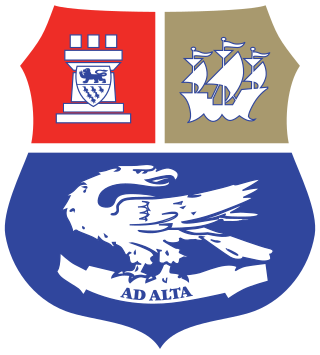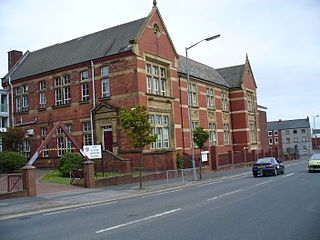Related Research Articles

Secondary education or post-primary education covers two phases on the International Standard Classification of Education scale. Level 2 or lower secondary education is considered the second and final phase of basic education, and level 3 upper secondary education or senior secondary education is the stage before tertiary education. Every country aims to provide basic education, but the systems and terminology remain unique to them. Secondary education typically takes place after six years of primary education and is followed by higher education, vocational education or employment. In most countries secondary education is compulsory, at least until the age of 16. Children typically enter the lower secondary phase around age 12. Compulsory education sometimes extends to age 20.
In the education systems of England, Northern Ireland, Wales, Jamaica, Trinidad and Tobago and some other Commonwealth countries, sixth form represents the final two years of secondary education, ages 16 to 18. Pupils typically prepare for A-level or equivalent examinations like the International Baccalaureate or Cambridge Pre-U. In England, Wales, and Northern Ireland, the term Key Stage 5 has the same meaning. It only refers to academic education and not to vocational education.
Education in the United Kingdom is a devolved matter with each of the countries of the United Kingdom having separate systems under separate governments. The UK Government is responsible for England, whilst the Scottish Government, the Welsh Government and the Northern Ireland Executive are responsible for Scotland, Wales and Northern Ireland, respectively.
The Tripartite System was the arrangement of state-funded secondary education between 1945 and the 1970s in England and Wales, and from 1947 to 2009 in Northern Ireland. It was an administrative implementation of the Education Act 1944 and the Education Act 1947.
A key stage is a stage of the state education system in England, Northern Ireland, the Isle of Man and the British Overseas Territory of Gibraltar setting the educational knowledge expected of students at various ages. The term is also used in some other autonomous territories such as Hong Kong, and countries such as Australia, although the ages at which each key stage applies differ between countries.

A secondary modern school is a type of secondary school that existed throughout England, Wales and Northern Ireland from 1944 until the 1970s under the Tripartite System. Schools of this type continue in Northern Ireland, where they are usually referred to as secondary schools, and in areas of England, such as Buckinghamshire, Lincolnshire and Wirral,.

Seaford College is an independent co-educational boarding and day school at East Lavington, south of Petworth, West Sussex, England. Founded in 1884, it is a member of the Headmasters' and Headmistresses' Conference. The college is in Lavington Park, a 400 acres (1.6 km2) Area of Outstanding Natural Beauty in the South Downs. The land is owned by a charitable trust and the site is run by the Board of Governors who are the trustees. The college is the inspiration for the Jennings and Darbishire children's books, written by alumnus Anthony Buckeridge.
Educational stages are subdivisions of formal learning, typically covering early childhood education, primary education, secondary education and tertiary education. The United Nations Educational, Scientific and Cultural Organization (UNESCO) recognizes nine levels of education in its International Standard Classification of Education (ISCED) system. UNESCO's International Bureau of Education maintains a database of country-specific education systems and their stages. Some countries divide levels of study into grades or forms for school children in the same year.
Sunderland College, officially City of Sunderland College, is a further education and higher education college based in Sunderland, North East England. The enrolment includes around 6,300 part-time learners and approximately 4,800 full-time students. A report following a January 2010 Ofsted inspection awarded the school a Grade 2 (good) that included a Grade 1 (outstanding) on 3 inspection criteria. The college is a member of the Collab Group of high performing schools.

The Elementary Education Act 1870, commonly known as Forster's Education Act, set the framework for schooling of all children between the ages of 5 and 12 in England and Wales. It established local education authorities with defined powers, authorized public money to improve existing schools, and tried to frame conditions attached to this aid so as to earn the goodwill of managers. It has long been seen as a milestone in educational development, but recent commentators have stressed that it brought neither free nor compulsory education, and its importance has thus tended to be diminished rather than increased.
Ashton Middle School was a middle school in Dunstable, Bedfordshire, England, under the Central Bedfordshire Local Education Authority.

Pine Tree Academy is a Seventh-day Adventist, co-educational University preparatory school for boarding and day students in grades K–12. It is a part of the Seventh-day Adventist education system, the world's second largest Christian school system. The school is located in Freeport, Maine, north of Portland.

The Endowed Schools Act 1869 was an Act of the Parliament of the United Kingdom. It was one of the Endowed Schools Acts 1869 to 1948. It was passed during William Ewart Gladstone’s first ministry, to restructure endowed grammar schools in England and Wales.

The Higher Grade School building in Barrow-in-Furness, Cumbria, England is Grade II listed and has functioned as a number of educational institutions throughout its long history. From completion until 1930 the building was occupied by the Barrow Higher Grade School.
The history of education in England is documented from Saxon settlement of England, and the setting up of the first cathedral schools in 597 and 604.

Herbert Schofield, PhD, was a leading figure in technical education, a Rotarian and, from 1915 to 1950, a Principal of Loughborough College, which became Loughborough University.

In England and Wales, a public school is a type of fee-charging private school originally for older boys. They are "public" in the sense of being open to pupils irrespective of locality, denomination or paternal trade or profession; nor are they run for the profit of a private owner.

Elementary schools were the first schools in England and Wales intended to give a basic education to the children of working class families. At the start of the 19th century, the only schooling available to these young people was run by private concerns or by charities, and was often of a very poor standard. In the first decades of that century, a network of elementary schools was established by societies backed by the Christian churches. In an effort to expand this "voluntary" system, the government made grants available to these societies, initially for new school buildings but later towards their running costs. It became apparent that although this system worked reasonably well in rural communities, it was far less successful in the rapidly expanding industrial cities, and that Britain was falling behind the rest of the developed world. In 1870, an act of parliament established elected school boards throughout England and Wales, which were empowered to create secular "board schools" funded by local taxation where there was no provision by the church societies. Further legislation made school attendance compulsory, and eventually free of charge. The problem of how the education of older pupils should be managed was solved by abolishing school boards in 1902 and passing responsibility to local councils. Elementary schools were eventually replaced in 1944 by the system of primary and secondary education.
The Cockerton Judgement of 1899 determined that it was unlawful for the London School Board to spend money raised in the rates to fund higher-grade classes in science and art, thus limiting them to providing education for the under 12s.
References
- ↑ Vlaeminke, Meriel (2000). The English Higher Grade Schools: A Lost Opportunity. London: Woburn Press. ISBN 0-7130-0220-4.
- ↑ Gillard, Derek. "Education in England: a history - Introduction, Contents, Preface". www.educationengland.org.uk. Derek Gillard. Retrieved 25 July 2021.